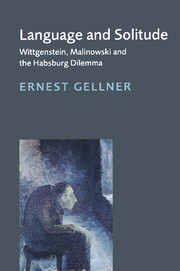Book contents
- Frontmatter
- Contents
- Preface
- Foreword
- Part I The Habsburg dilemma
- Part II Wittgenstein
- 10 The loneliness of the long-distance empiricist
- 11 The poem to solitude, or: confessions of a transcendental ego who is also a Viennese Jew
- 12 Ego and language
- 13 The world as solitary vice
- 14 The mystical
- 15 The central proposition of the Tractatus: world without culture
- 16 Wittgenstein mark 2
- 17 Tertium non datur
- 18 Joint escape
- 19 Janik and Toulmin: a critique
- 20 The case of the disappearing self
- 21 Pariah communalism
- 22 Iron cage Kafka-style
- Part III Malinowski
- Part IV Influences
- Part V Conclusions
- General bibliography
- Bibliographies of Ernest Gellner's writings on Wittgenstein, Malinowski, and nationalism
- Index
10 - The loneliness of the long-distance empiricist
Published online by Cambridge University Press: 05 March 2010
- Frontmatter
- Contents
- Preface
- Foreword
- Part I The Habsburg dilemma
- Part II Wittgenstein
- 10 The loneliness of the long-distance empiricist
- 11 The poem to solitude, or: confessions of a transcendental ego who is also a Viennese Jew
- 12 Ego and language
- 13 The world as solitary vice
- 14 The mystical
- 15 The central proposition of the Tractatus: world without culture
- 16 Wittgenstein mark 2
- 17 Tertium non datur
- 18 Joint escape
- 19 Janik and Toulmin: a critique
- 20 The case of the disappearing self
- 21 Pariah communalism
- 22 Iron cage Kafka-style
- Part III Malinowski
- Part IV Influences
- Part V Conclusions
- General bibliography
- Bibliographies of Ernest Gellner's writings on Wittgenstein, Malinowski, and nationalism
- Index
Summary
There are diverse paths to loneliness. One man may tread more than one of them. Solitude may well be overdetermined.
One path is that taken by the mainstream of Western philosophy. It began with the Promethean defiance of René Descartes, who decided to go it alone, to step outside the custom and prejudice of his own age and culture and to seek truth on his own. He thought it would be possible to judge the culture in which he had been reared from the vantage point of a solitary individual purified by doubt, who accepts nothing other than that which his own reason compels him to accept. Cosmic exile, as Quine aptly named it, was, above all, cultural exile. It expresses extreme distrust of culture, one's own and all others. Moreover, Descartes felt an acute contempt for culture, which he called ‘custom and example’ and considered to be the source of all error. The human mind was so made as to ensure that, on its own, it would find the truth: this was Descartes' solution to the problem of evil, for it enabled him to exonerate God from the charge of leading us into error. It was not man as made by God who erred, but man as perverted by culture.
The punishment in due course meted out to this Promethean presumption fitted the crime perfectly: the sentence eventually imposed was – solitary confinement. If you accept the cognitive authenticity of nothing other than your own directly accessible data, in the end you are confined to a prison whose limits are indeed those data.
- Type
- Chapter
- Information
- Language and SolitudeWittgenstein, Malinowski and the Habsburg Dilemma, pp. 43 - 45Publisher: Cambridge University PressPrint publication year: 1998



